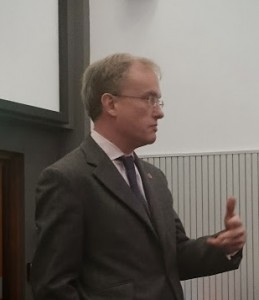The fall of advertising and the rise of digital PR

About the author
Richard Bailey Hon FCIPR is editor of PR Academy's PR Place Insights. He teaches and assesses undergraduate, postgraduate and professional students.

The head of government communications has described how changes to media and technology have enabled government to cut spending and achieve measurable results from taxpayers’ money.
Speaking to students at the University of West of England in Bristol yesterday, executive director of government communications Alex Aiken said there had been a shift from broadcast communications using advertising to more segmented communications using digital channels.
This had enabled the government to halve the annual cost of comms from £1 billion in 2010 to £500 million a year. Further cuts are expected after next year’s election.
He argued that government has been able to save money while becoming more effective because of a greater emphasis on measurable objectives.
“Too much comms places an emphasis on the creative output rather than on the objective (outcomes). Yet all communication should be about some sort of behaviour change.”
Government communicators have been encouraged to move away from SOS (‘sending out stuff’) to applying the OASIS model, thinking through the purpose of communicating from Objectives, Audience, Strategy, Implementation and Scoring.
An example of the change in approach is armed forces recruitment. He described how this used to rely heavily on mass media advertising. Now, an app designed to appeal to students has encouraged many more to apply to become Royal Navy engineers.
Public health campaigns demonstrate that effective communication is designed to influence behaviour change. He illustrated this by citing the 50-year drink-driving campaign that continues to save lives by modifying people’s attitudes and behaviour.
“We can no longer broadcast messages at people, we have to deliver shareable content. Social media also gives us a much greater ability to test our messages. But it involves a different mindset: I want to abolish talk of ‘press officers’ and ‘press releases’.”
Aiken described how government has four levers for effecting behaviour change: it can legislate, it can tax, it can regulate and it can communicate.
“Communications is very straightforward”, he said. “It’s about ABC: Audience, Brevity and Conversation.”
Despite the smaller budget, there are still some 3,000 people involved in communication roles across central government.
“Recruitment opens in January for 50 graduates and we’re looking for bright young people to develop their careers, especially in the area of digital communications.”
For more on this, see how Alex Aiken introduced the new Government Communication Service fast stream recruitment initiative.